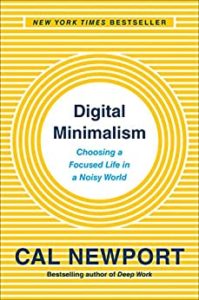 “What you need instead [of an ad hoc approach] is a full-fledged philosophy of technology use, rooted in your deep values, that provides clear answers to the questions of what tools you should use and how you should use them, and, equally important, enables you to confidently ignore everything else.” (p. XVI)
“What you need instead [of an ad hoc approach] is a full-fledged philosophy of technology use, rooted in your deep values, that provides clear answers to the questions of what tools you should use and how you should use them, and, equally important, enables you to confidently ignore everything else.” (p. XVI)
So begins “Digital Minimalism”* by Cal Newport. In case you think that he is an anti-technology Luddite, keep in mind that Cal is a computer science professor at Georgetown, with a PhD in Electrical Engineering and Computer Science from MIT. In “Deep Work” Cal instead helps us navigate our way through the social media “attention economy” with intention.
Digital Overwhelm
I came to “Deep Work” at a point where I felt that social media had taken over a significant portion of my life. As a technologist myself, I have been an early adopter of virtually all the social media platforms: Twitter, Facebook, Instagram, you name it. As they’ve grown in popularity over the years, so has the amount of time I’ve spent hoovering up posts by friends, relatives, “influencers”, and ideologues. I’ve watched the various platforms descend from a way to simply keep up with your high-school friends scattered across the globe to shouting matches of dogma, which, at times, I’m ashamed to say I’ve fallen into myself.
I recognized that I needed to break away, to regroup. What I thought I was getting from Cal was a digital detox. Instead, what I found was a framework for constructing a meaningful life, with technology merely a tool to support the values I had consciously chosen.
Digital Declutter
To quickly summarize, Cal takes us on a journey to show us first, how the deck is stacked against us, and then how digital minimalism helps us recapture a meaningful life.
The process begins with a “digital declutter”, which – as previously mentioned – is not a “digital detox”. Instead, it’s a process you undertake to “rediscover what’s important to you and what you enjoy outside the world of the always on, shiny digital.” (p. 71) Once you eliminate all but the absolutely necessary digital tools from your life for a period of time, you reintroduce them, but, “for each technology that you’re considering reintroducing into your life, you must first ask: does this technology directly support something that I deeply value.” (p. 75).
Note: it’s easy to think this is merely about social media, but think Netflix, video games, even news feeds. Basically anything you interact with via a screen.
Newport shows us the power and necessity of solitude, not in the monkish sense, but a “subjective state in which your mind is free from input from other minds”. (p. 93). (This one is huge for me. I may pat myself on the back for eliminating social media from my life, but as a voracious reader and learner, I am rarely without a book in my hand or a podcast in my ears!)
Minimalism Framework
Finally, “Deep Work” gives us a framework for filling in the holes left behind by decluttering our lives, helps us define what we really value, and gives us some practices for creating meaningful relationships and leisure time. In my mind, this is one of the most important parts of the book. In Matthew 12 Jesus tells us a parable about what happens when an “evil spirit” is driven out of a man. The spirit wanders around unable to find a place to rest. So he thinks to himself “the place I left is still empty; why don’t I go back there?” So he returns, and even brings seven of his friends with him. The man ends up in worse shape than he was to being with! Don’t overthink the analogy if you’re not a Jesus believer; I’m simply agreeing with Newport that you have to fill your life with something of value and meaning, or else you’ll go back to your old habits.
Conclusion
I read “Deep Work” and began my digital declutter in May of 2020. At the time of this writing (January 2021) I am still in the midst of the process. I have felt the need to dip my toes back in social media for group and family announcements, and occasionally to track a few “experts” on Twitter, but it almost always ends badly. I have a rough technology framework documented, but I know it will take some drastic new habits to put it in place. Swimming against the current is hard; especially in our digital culture, the expectations from even your closest friends and relatives is strong. “Have you seen (blank’s) Facebook post?” “Are you following (blank) on Instagram?” Seemingly harmless questions, but temptations nonetheless. All I know is that while I’m intentional about my technology use, I am much more at peace.
* Links to products are often “Affiliate Links” that produce a few pennies for us when you purchase. It doesn’t cost you more, but it helps us keep the lights on.